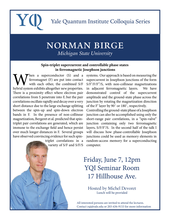Spin-triplet supercurrent and controllable phase states in ferromagnetic Josephson junctions
When a superconductor (S) and a ferromagnet (F) are put into contact with each other, the combined S/F hybrid system exhibits altogether new properties. There is a proximity effect where electron pair correlations from S penetrate into F, but the pair correlations oscillate rapidly and decay over a very short distance due to the large exchange splitting between the spin-up and spin-down electron bands in F. In the presence of non-collinear magnetization, Bergeret et al. predicted that spin-triplet pair correlations are generated, which are immune to the exchange field and hence persist over much longer distances in F. Several groups have observed convincing evidence for such spin-triplet correlations in a variety of S/F and S/F/S systems. Our approach is based on measuring the supercurrent in Josephson junctions of the form S/F’/F/F’’/S, with non-collinear magnetizations in adjacent ferromagnetic layers. We have demonstrated control of the supercurrent amplitude and the ground-state phase across the junction by rotating the magnetization direction of the F’ layer by 90˚ or 180˚, respectively.
Controlling the ground-state phase of a Josephson junction can also be accomplished using only the short-range pair correlations, in a “spin-valve” junction containing only two ferromagnetic layers, S/F/F’/S. In the second half of the talk I will discuss how phase-controllable Josephson junctions could be used as memory elements in random-access memory for a superconducting computer.
